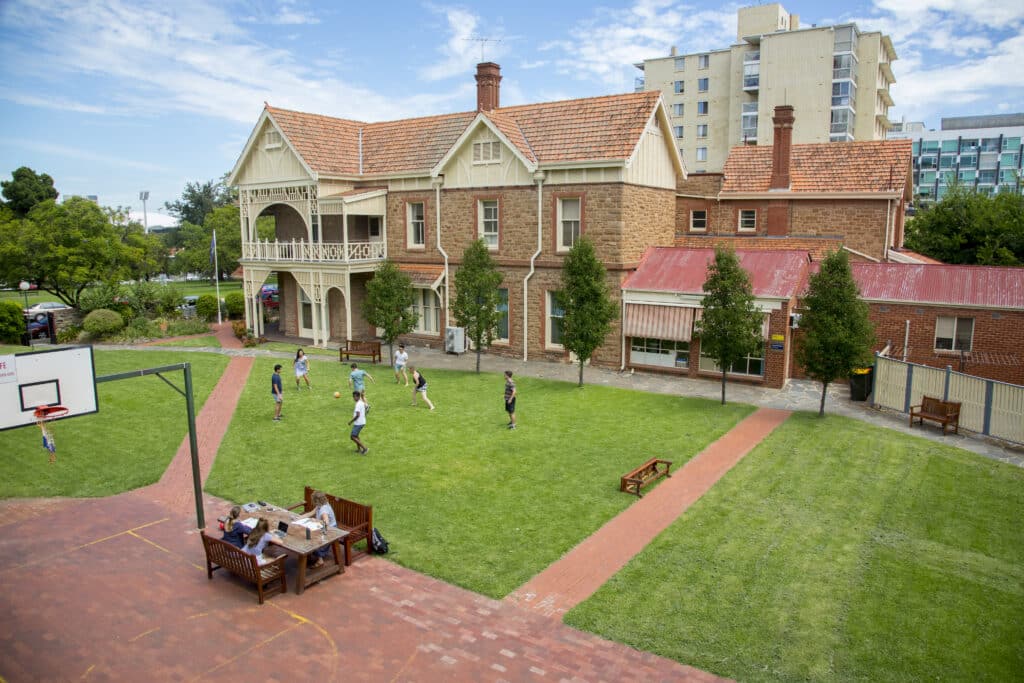
Research provides strong evidence that living in a residential college leads to higher academic achievement and levels of well-being. If you need to relocate to pursue higher education after High School, we look at why moving into a residential college offers the greatest value in terms of inclusions and outcomes, as well as the most well-rounded and supported way to live.
Fundamentally, residential colleges are scholarly places of community, connection, and care. As places of belonging and being known, they are a home and a family; places of support and security while away from your biological family, old friendships, and familiarity of home towns and countries. Residential colleges offer far more than a commercial transaction; they are an educational and relational experience, nurturing and leading; transnational in their diversity and life-long networks, but also transformational in their enhancement of the best possible university experience.
Facilitating personal development, social engagement, and diversity
Research has consistently found that living in residence is not only positively related to learning outcomes, but also additional developmental outcomes. Residential Colleges play a very important role in this regard, offering a range of enriching experiences that enhance formal tertiary curriculum, and engage students in the social life of the college. Importantly, such programs have the capacity to link formal learning with community settings – supporting contexts that boost the relevance of study.
Residential colleges are a community, with residents, staff, academics and the broader professional community learning from and interacting with one another in many contexts, culminating in what Markwell (2007) describes as “… a sense of engagement in a rich intellectual and public debate outside the classroom, strong attention to student welfare and pastoral care, and concern for the development of character and values … helped by the strong sense of cohort – of belonging …”
The former Commonwealth Minister for Education and former Foreign Minister, and current Chancellor of the Australian National University, Julie Bishop, noted that colleges “bring great benefits to their universities, providing much of their colour and cultural engagement … they provide the college’s students with the opportunity to make lifelong friends and to develop a crucial set of mentors who will be able to guide them through life.”
Similarly, the former Principal of Women’s College, Sydney University, and former Governor General, Dame Quentin Bryce noted: “The residential life adds immeasurably to the value of a university education. The intensity of intellectual stimulation, the social and cultural enrichment, the deep sense of belonging, and the formation of lifelong friendships, are an irreplaceable experience.”
Acknowledging the changing nature of residential accommodation in recent times, with a commercial focus on the provision and management of larger more modern purpose-built student accommodation (PBSA), Dr Edwina Ridgeway, Australia’s longest-serving Head of College, notes that while students will be attracted by shiny, new accommodation facilities and are perhaps not as willing to pay for more ‘dated’ facilities, the nature and quality of community rather than on the building and its amenities, with things such as academic support, pastoral care, student leadership opportunities, positive traditions, being known by the staff and staff-student interactions, are more important to students.
Markwell further noted that “when I speak of a university residential college, I mean to speak, not of a building or set of buildings, but of a community – a group of people, not merely a physical facility. Quite simply, for me a residential college is a residential academic community, a community bringing together students of diverse backgrounds and disciplines in close contact both with each other, and others who work to ensure that the college is a rich learning environment for its students.”
In his address to St Andrew’s College at Sydney University, Dr Rufus Black, spoke of colleges as “…intentional academic communities … place-based institutions believe that coming together in a physical place is essential to creating the depth of relationships and trust that constitutes a college community.” Residential colleges offer more than a “transactional bargain” and more than just “engagement”, but the opportunity for students to “become skillful in ideas-centered interpersonal interactions, engage in team-based problem solving, harness diversity and build networks.” A “rich collegiate environment” involves “peer-to-peer learning” and it is about “forming the whole person
Tailored support
Research has affirmed the importance of not only student support and engagement, but tailored support in the form of individual mentoring and advising, which is focused on and responsive to individual student needs. Residential colleges help students develop their identity within a year level or disciplinary cohort, develop relationships with staff who know their name, and access forms of pastoral support that may not be offered by much larger institutions.
Enhancing academic outcomes
Intuitively, it seems clear that living in a university-affiliated residence would enhance educational involvement and outcomes. Residential colleges have been shown to enhance many educationally productive characteristics of undergraduate education.
Many colleges offer supplementary academic programs that can have a direct impact on learning and development outcomes. Small-group tutorials may underpin or raise academic expectations, prompt active and integrative forms of learning, build collaborative relationships that extend beyond formal instructional settings, or facilitate mentoring relationships between early- and later-year students. By relating to the student as an individual, immersing them in an intellectual climate, providing for greater informal contact with academic staff, linking learning with people’s lives, and exposing them to enriching academic contexts, colleges can play a very important role in shaping student expectations and their sense of what they would like to achieve.
With the increasing demand for student accommodation for students relocating to study; the increased risk of student isolation, loneliness and lack of support; the undoubted enrichment of the student experience from cross-disciplinary and cross-cultural engagement; the need for safety and care as well as the opportunities for intellectual and leadership development; and the making of lasting friendships across the globe, the case for residential colleges is clear.
Check out the Lincoln College website and Prospectus for full details on the support programs and facilities on offer to bring the residential college experience to life for those looking to study in Adelaide after High School

Blimling, G. (1989). A meta-analysis of the influence of college residence halls on academic performance. Journal of College Student Development 30(4): 298- 308.
Blimling, G. (1993). The influence of college residence halls on students. Pages 248-307 in: Smart, J. (Ed.) Higher Education: Handbook of theory and research 9. New York: Agathon Press
Coates, H., & Edwards, D. (2009). Engaging college communities: The impact of residential colleges in Australian higher education.
Daniel, C. (2008). The Educational Attributes of Some of the World’s ‘Top 50’ Universities – A discussion paper. Perth: The University of Western Australia.
LaNasa, S.M., Olson, E. & Alleman, N. (2007). The Impact of on-campus student growth on first-year student engagement and success. Research in Higher Education, 48(8), 941-66.
Markwell, D. (2007). A Large and Liberal Education: Higher education for the 21st century. Melbourne: Australian Scholarly Publishing & Trinity College, University of Melbourne
Pascarella, E., Terenzini, P. & Blimling, G. (1994). The impact of residential life on students. Pages 22- 52 in: Schroeder, C. & Mable, P. (Eds.), Realizing the Educational Potential of Residence Halls. San Francisco: Jossey-Bass Publishers.
Parameswaran, A., & Bowers, J. (2014). Student residences: From housing to education. Journal of Further and Higher Education, 38(1), 57-74.
Tambyah, S. K. (2022). The Impact and Potential of Residential Colleges: An Overview. Student Growth and Development in New Higher Education Learning Spaces, 1-13.






